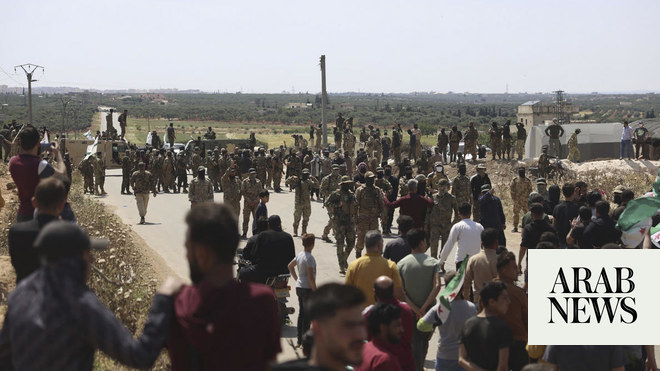
More than half of Idlib is controlled by Hayat Tahrir Al-Sham (HTS), led by Syria’s former Al-Qaeda affiliate
The rest is held by the National Liberation Front (NLF)
BEIRUT: Syria’s militant-dominated Idlib province is the last major area still outside regime control, after a string of ferocious assaults this year put most of the country back in government hands.
The northwestern province and surrounding rebel-held territory are home to three million people, around half displaced from other parts of the country which have been recaptured by Russian-backed Syrian regime forces.
On Friday regime artillery fire killed seven civilians in Idlib, the highest death toll since a Russian-Turkish deal last month and ahead of Turkey’s four-way summit Saturday seeking a solution to the conflict.
The province shares a border with rebel-backer Turkey and is also adjacent to Latakia, a regime stronghold on the Mediterranean coast home to President Bashar Assad’s clan.
Before fighting broke out in 2011, most of Idlib’s inhabitants worked in agriculture, mainly growing cotton and cereals, or commuted to neighboring Aleppo province.
In March 2015, a coalition of Islamist fighters including some linked to Al-Qaeda seized the provincial capital and other key towns and government military installations.
Hardcore militant factions have since overpowered more moderate rebels.
More than half of Idlib is controlled by Hayat Tahrir Al-Sham (HTS), led by Syria’s former Al-Qaeda affiliate, with other hard-liners also present.
The rest is held by the National Liberation Front (NLF), an alliance formed in August that merged Islamist groups Ahrar Al-Sham and Nureddine Al-Zinki with other rebel factions.
The NLF, which has Turkey’s backing, is meant to counter the growing power of HTS.
The area’s residents include tens of thousands of rebels and civilians transferred since 2014 from areas recaptured by the regime in its notorious “reconciliation” deals.
The United Nations has warned that, in case of a regime assault on the province, there is “no other Idlib” to which residents can flee.
Government forces have been accused of several chemical attacks in Idlib.
A UN commission has found that helicopters from a pair of regime-controlled air bases dropped chlorine-filled barrel bombs on two Idlib villages in 2014 and 2015.
The commission later concluded that the army also carried out a chemical attack, probably with chlorine, on a third village in 2015.
A sarin gas attack in April 2017 hit the town of Khan Sheikhun, killing 83 people, according to the UN.
The Britain-based Syrian Observatory for Human Rights said 87 died, including more than 30 children.
The UN blamed the government, which has consistently denied responsibility.
In 2017, Idlib was declared one of four “de-escalation” zones established by the three main powerbrokers of Syria’s conflict — Russia, Iran and Turkey — in a bid to reduce violence.
While there was an initial drop in fighting, the de-escalation zones did not hold.
In December, government forces backed by Russian air power launched an offensive on southeast Idlib, which ended weeks later with their recapture of dozens of villages and towns there, as well as the military airport of Abu Duhur.
The government then retook the other three de-escalation areas — Eastern Ghouta near Damascus, towns in Homs province, and Syria’s south — in military assaults culminating in surrender deals.
“Now Idlib is our goal,” Assad said on July 26.
In late summer, troops began amassing around the province.
On August 9 government forces shelled some areas there and dropped leaflets urging people to surrender.
Russian air raids struck the province over several days starting on September 7, raising fears that an all-out assault was imminent.
According to the United Nations, an offensive against Idlib could displace up to 800,000 people and lead to a humanitarian “catastrophe.”
In an apparent breakthrough after a flurry of meetings between key players in the conflict, Russia and Turkey announced a deal on September 17 to create a demilitarized buffer zone ringing the Idlib region.
It would separate rebel and regime fighters, thereby averting a massive assault by Assad’s forces.
All factions in the planned buffer were supposed to hand over heavy weapons by October 10, and radical groups were supposed to withdraw by October 15.
The first deadline was met on time, according to Turkey, the Syrian Observatory for Human Rights war monitor and rebels.
But to date the militants remain in the zone and have vowed to continue fighting.












